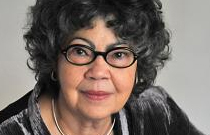On Oct. 18, Olive Senior visited York University and talked about her collection of short stories The Pain Tree.

Senior is an acclaimed poet, fiction writer and researcher, who in 2005 received the Musgrave Gold Medal from the Institute of Jamaica for her contribution to literature.“Because I grew up in Jamaica, which has an oral culture, I see the short story as a collaboration between reader and writer,” Senior said. Her short stories leave the reader thinking about the characters and about what will happen to the protagonist next. Even with a story like “Boxed In,” which is
“Because I grew up in Jamaica, which has an oral culture, I see the short story as a collaboration between reader and writer,” Senior said. Her short stories leave the reader thinking about the characters and about what will happen to the protagonist next. Even with a story about a villain like “Boxed In,”Senior invites the reader into this character’s mind, to see his struggle with modernity encroaching on his traditional way of life.
The author explained that although her stories are all set in a very specific locale, in Jamaica, “I write about human emotions that we all have in common. Our stories might vary, but we all share the same emotions, dreams, desires.” Her characters are composites of people she sees and hears. “All of my stories are grounded in a reality that I know.
The questions that drive all of my writing are: why are we who we are, what are the forces that shape us as human beings?”
 She explained that she likes the short story genre because of its compression or distillation of thought. With a short story, “I feel I can hold the whole thing in my head,” she said. And at the end of writing and revising a story, Senior always looks for its kernel, to make sure that the main idea of the story is visible.
She explained that she likes the short story genre because of its compression or distillation of thought. With a short story, “I feel I can hold the whole thing in my head,” she said. And at the end of writing and revising a story, Senior always looks for its kernel, to make sure that the main idea of the story is visible.
Her story “The Country Cousin” details the visit of Rose to the home of Mrs. Fennel, who having married well, refuses to acknowledge her modest beginnings. This is a story about authenticity: Rose succeeds because she is authentic, while Mrs. Fennel fails because she lives in a manufactured world that she herself has created to satisfy her own ideas of upper-class living.
“The Pain Tree” is a story based on a practice Senior grew up with. The narrator of this story is enabled by the gift from the poor woman to see “the other” and to see her childhood and the world from a different perspective. The writer talked about how important it is to be able to empathize with others. She said, “I come out of a very narrow world, and my entire life has been spent breaking out of those barriers. We can only change the world if we reach out to the other.”
Her stories invite us to see what makes us human and understand the motivations and complex situations that people live in. Her characters are individual people who nevertheless tell us something about our humanity.
On Nov. 1, author Leslie Graham read from Settler Education. The next reading will take place Nov. 15 and will see Helen Humphreys read from her book The Evening Chorus. Readings are free and open to any member of the public. For more information, contact Professor Leslie Sanders at leslie@yorku.ca or Professor Gail Vanstone at gailv@yorku.ca. All readings are held Tuesdays from 7 to 9pm in 206 Accolade West Building, Keele campus.


